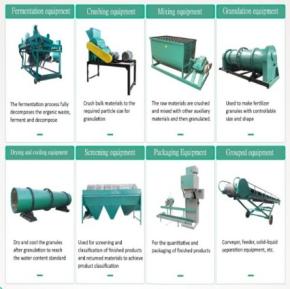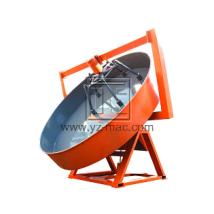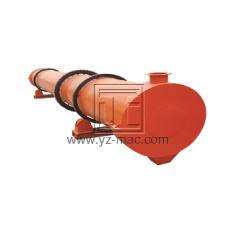Mechanical composter
A mechanical composter is a revolutionary waste management solution that utilizes advanced technology to efficiently convert organic waste into valuable compost. Unlike traditional composting methods, which rely on natural decomposition processes, a mechanical composter accelerates the composting process through controlled conditions and automated mechanisms.
Benefits of a Mechanical Composter:
Rapid Composting: A mechanical composter significantly reduces composting time compared to traditional methods. By providing optimal conditions for microbial activity, such as temperature, moisture, and aeration control, it accelerates the breakdown of organic waste into compost in a shorter period.
Enhanced Efficiency: Mechanical composters offer consistent and reliable performance, ensuring high productivity and efficiency in waste conversion. The automated processes, including mixing, turning, and temperature management, eliminate the need for manual labor and provide a more controlled composting environment.
Odor and Pest Control: The closed and controlled design of a mechanical composter helps contain odors and prevent pest infestations. The efficient decomposition process minimizes foul odors typically associated with organic waste, making it more suitable for urban and residential areas.
Nutrient-Rich Compost: The controlled conditions in a mechanical composter promote the breakdown of organic matter into nutrient-rich compost. The resulting compost is of high quality, with balanced nutrient content, ideal for enriching soils, promoting plant growth, and reducing reliance on chemical fertilizers.
Working Principle of a Mechanical Composter:
A mechanical composter utilizes a combination of automated processes and controlled environmental factors to facilitate waste decomposition. The composting chamber is designed with features such as mixing blades, aeration systems, temperature sensors, and moisture control mechanisms. These components work together to create an ideal environment for microbial activity, ensuring efficient breakdown of organic waste into compost.
The waste is introduced into the composting chamber, where the mixing blades ensure thorough blending and aeration of the materials. The aeration system promotes oxygen circulation, crucial for aerobic decomposition. Temperature sensors and heating elements help maintain optimal composting temperatures, supporting microbial activity and speeding up the process. Moisture control mechanisms regulate the moisture content within the composter, ensuring ideal conditions for microbial growth.
Applications of Mechanical Composters:
Municipal Waste Management: Mechanical composters are widely used in municipal waste management systems. They offer an efficient and sustainable solution for processing organic waste from residential, commercial, and industrial sources, reducing landfill reliance and promoting resource recovery.
Food Processing Industries: Mechanical composters find applications in food processing industries, where significant quantities of organic waste are generated. By converting food waste into compost, these industries can reduce disposal costs, improve sustainability practices, and contribute to circular economy initiatives.
Agricultural and Farming Operations: Mechanical composters benefit agricultural and farming operations by providing a convenient method for converting agricultural residues, livestock manure, and crop residues into nutrient-rich compost. This compost can be used to enrich soils, improve soil structure, and enhance crop productivity.
Educational and Research Institutions: Mechanical composters are valuable tools for educational institutions, research facilities, and environmental organizations. They enable hands-on learning opportunities, research studies on composting processes, and the development of sustainable waste management strategies.
A mechanical composter offers an efficient, controlled, and automated solution for converting organic waste into valuable compost. With benefits such as rapid composting, enhanced efficiency, odor and pest control, and nutrient-rich compost production, mechanical composters contribute to sustainable waste management practices. They find applications in municipal waste management, food processing industries, agricultural operations, and educational institutions. By adopting mechanical composters, we can divert organic waste from landfills, reduce environmental impact, and contribute to a more sustainable and circular economy.







